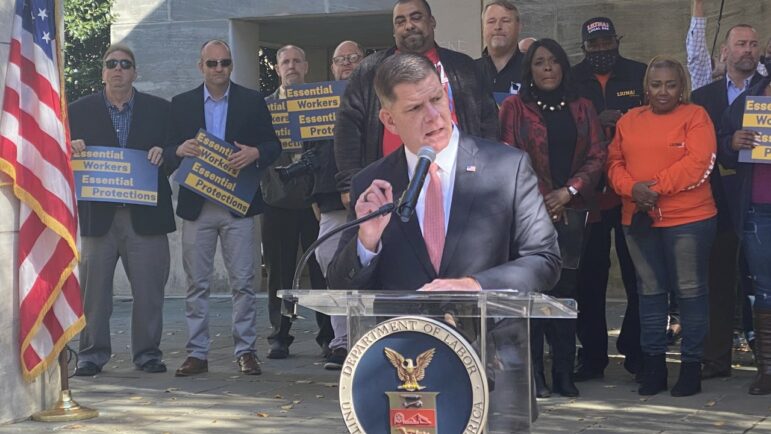An estimated 327,000 people across the country could see a pay increase under a new U.S. Department of Labor rule announced Monday. Starting January 30, federal contractors will be required to pay workers a new $15-an-hour minimum wage. Labor Secretary Marty Walsh spoke about the policy during a trip to Birmingham.
“The raise comes at a time to match historic federal investments,” Walsh said in reference to the infrastructure package President Biden signed into law last week. “It’s going to create millions of new jobs with construction and other new jobs that will spin-off of that.”
The new rule stems from an executive order Biden issued on April 27. The wage rate will adjust annually based on inflation. It applies to new contracts along with renewals and extensions of existing contracts.
Walsh met with residents and union workers from across the southeast at Kelly Ingram in downtown Birmingham, the site of the iconic civil rights Children’s March in 1963. He said he wanted to make the wage announcement in Birmingham because of the city’s historic significance in fighting for racial justice.
“The black community has been the driving force in the fight to raise the minimum wage all across this country and right here in Birmingham,” Walsh said. “It will especially help women and workers of color, who too often get underpaid. And it will have a big impact here in the south.”
Congresswoman Terri Sewell, who spoke at the rally, said Alabamians deserve fair wages.
“In the state of Alabama minimum wage is $7.25 and it’s simply not enough to be able to provide for our families. We know that and we are trying every day to make sure that we’re uplifting the standards of safety as well as wages for all Americans,” Sewell said.
Carolyn Morris, a federal contractor and union member at U.S. Steel in Birmingham, said she gets paid $11.80 an hour.
“Making $15 an hour will mean so much to me and my family. It’s hard making ends meet. The expenses of a household costs so much now,” Morris said.
This new rule applies to people with disabilities. It also does away with what’s known as the tipped minimum wage. That means tipped workers are paid a lower wage with tips expected to make up the difference. Tipped workers will be paid the full minimum wage by 2024.

